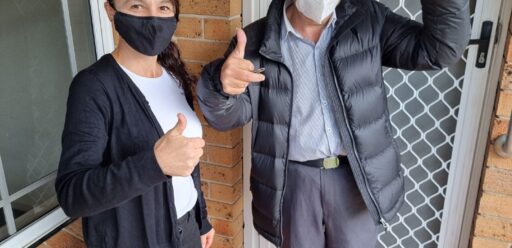Ageing and sleeping on a camp bed in a boarding house

Robert* was living in a boarding house where his only private space was an unlockable bedroom. Robert was a victim of domestic violence by a relative with a mental health condition. At the boarding house he was exposed to daily harassment and intimidation from other tenants who sometimes knocked on his door asking for cigarettes or “loans”. Robert felt increasingly socially isolated. At age 69, he didn’t want his friends and family visiting him while he was living in these circumstances.
Robert feared for his safety and avoided the shared kitchen. He wasn’t able to cook or eat properly and his health suffered. His arthritis got worse and he lost weight. Robert’s asthma also worsened due to the many smokers at the boarding house and he needed to increase his medication. His outlook on life was poor and he felt older than his years.
Robert was referred to Age Matters to look at appropriate and sustainable housing. We visited Robert in the boarding house and worked on a plan of action. Robert had previously applied for social housing but was not considered a priority, leaving him on the general wait list of up to several years.
We made several referrals on Robert’s behalf to a number of housing associations. We also referred Robert to a financial counsellor to prepare a budget. We helped Robert obtain a letter from his doctor to support his accommodation bid. We discovered and rectified a miscommunication with Department of Housing reflecting inaccurate circumstances. After four months Robert was offered secure accommodation which suited his needs perfectly at this stage of his life.
Robert had been sleeping on a camp bed at the boarding house and now needed essential household items. We were able to help Robert with a fridge and a bed for this new home, improving his comfort and ability to remain living independently.
Robert is now enjoying growing vegetables in a small garden in his new accommodation. He now safely invites friends and family to visit him allowing him feel connected again. His new home is close to public transport and local shops so he can maintain and increase his independence, community networks and social inclusion.
We’ve confirmed through follow-up visits that Robert’s physical wellbeing has improved with better food, no sleep disturbances from noisy tenants and better safety and security. Importantly, Robert’s outlook on life has a renewed sense of optimism and direction thanks to our support and his improved wellbeing.
We rely on support from people like you to offer the holistic support people like Robert need. Please donate today to help our homelessness programs.
*name changed for privacy
You may also like
What to do about a neighbour who hoards
We’ve all seen the shock headlines with the massive and costly cleanouts. The TV shows and mainstream media depict an extreme makeover approach to resolve…
Safe homes for vulnerable people
Meet John*. John (pictured) is very excited after receiving the keys to his new, safe and secure home. John’s story, unfortunately hasn’t always been a…


